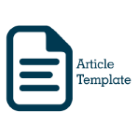THE DIFFERENCES BETWEEN WESTERN VIEWS AND ISLAMIC VIEWS OF FINANCIAL REPORTS WITH RELATIONS TO THE FIVE OBJECTIVES OF SHARIAH AND THREE LEVELS OF MAQASID PARADIGM
Abstract
Financial reporting are one of the most important elements that is usually use to know the financial information in an organisation either it’s finance is in a good condition or otherwise. The purpose of this paper is to enhance one's knowledge base by discussing and sharing the current inconsistencies between western and Islamic financial reports. The following are the study's objective in further detail which are to know the inconsistencies between western and Islamic financial reports as well as to analyse the relationship of financial reports with the five objectives of shariah and three levels of maqasid paradigm. The problems arise in this issues are due to the conflicts between western and Islamic views on financial reports in organisations as well as conflicts in the used of financial reports from western views or Islamic views in Islamic organisations. The methodology applied is qualitative, which are study through articles and journals. Therefore, the findings that are found in this study is the analysis of comparative between the financial reports from western or conventional views and Islamic views in terms of the balance sheet and income statement like zakat elements and Islamic derivatives financial instruments in Islamic views. There is a lack of academic research in the comparative of financial reports from western views and Islamic views especially in terms of its relationship with the five objectives of shariah and three levels of maqasid paradigm (al-dharuriyyat, al-hajiyyat and al-tahsiniyyat). Thus, this study provides the information on the comparative analysis between the two views as well as the relationship with the five objectives of shariah and three levels of maqasid paradigm.
Keywords
Full Text:
PDFReferences
Ahmed, F. S. (2011). Impact of Microcredit Programme For The Rural Poor: Evidence from Amanah Ikhtiar Malaysia. Research Journal of Applied Sciences, 6, 290-294.
Akkas, M. B. (2008). Text Book on Islamic Banking. Islamic Economics Research Bureau.
Al-Omar, A. H. (1996). Islamic banking theory, practice and challenges. New Jersey: Oxford University Press.
Alam, M. M. (2015). Performance of Islamic Microcredit In Perspective of Maqasid Al-Shariah: A Case Study on Amanah Ikhtiar Malaysia. Humanomics, 31, 374-384.
Azhar Rosly, S. (2010). Shariah Parameters Reconsidered. International Journal of Islamic and Middle Eastern Finance and Management, 3, 132-146.
Bakar, N. a. (2010). Motivations of Paying Zakat on Income: Evidence from Malaysia. International Journal of Economics and Finance, 2.
Bensoussan, E. (2020). What is Financial Reporting and Why is it Important? Retrieved from North One: https://www.northone.com/blog/small-business/what-is-financial-reporting
Bonetti, P. M. (2016). The Influence of Country?and Firm? level Governance on Financial Reporting Quality: Revisiting the Evidence. Journal of Business Finance & Accounting, 43, 1059-1094.
Carcello, J. V. (2004). Audit Firm Tenure and Fraudulent Financial Reporting. Auditing: A Journal of Practice & Theory, 55-69.
Chapra, M. U. (2008). Ibn Khaldun's Theory of Development: Does It Help Explain The Low Performance of The Present-Day Muslim World? The Journal of Socio-Economics, 37, 836-863.
Clor?proell, S. M. (2014). The Impact of Recognition Versus Disclosure on Financial Information: A Preparer's Perspective. Journal of Accounting Research, 52, 671-701.
Dusuki, A. W. (2011). The framework of Maqasid al-Shari'ah and Its Implication For Islamic Finance. Islam and Civilisational Renewal, 8, 37-51.
Doyle, J. G. (2007). Determinants of Weaknesses In Internal Control Over Financial Reporting. Journal of accounting and Economics, 44, 193-223.
Drury, A. (2021). The Three Major Financial Statements: How They're Interconnected. Retrieved from Investopedia: https://www.investopedia.com/ask/answers/031815/how-are-three-major-financial-statements-related-each-other.asp
Islam SMF. (2015). Islamic Banking: A True Alternative to Interest Based Conventional Banking, . International Scholar Journal of Accounting and Finance, 33-40.
Kamali, M. H. (2011). Maqasid Al-Shari'ah and Ijtihad as Instruments of Civilisational Renewal: A Methodological Perspective. Islam and Civilisational Renewal, 2, 245.
Laldin, M. A. (2013). Developing Islamic Finance In The Framework of Maqasid Al-Shari'ah: Understanding The Ends (Maqasid) And The Means (Wasa'il). International Journal of Islamic and Middle Eastern Finance and Management, 6, 278-289.
Malaysia World's Islamic Finance Marketplace. (2023, May 3). Global Islamic finance industry to grow 10% in 2023-2024 despite economic slowdown. Retrieved from National News: https://www.mifc.com/-/global-islamic-finance-industry-to-grow-10-in-2023-2024-despite-economic-slowdown
Mannan, M. (2012). Islami Bankbabostha . Central Shariah Board for Islamic Banks of Bangladesh.
Nouh, M. (2012). Sustainable Development in a Muslim Context. Faith Values and Education for Sustainable Development, 39.
Rasool, M. S. (2018). Enhancing Wellbeing of Low Income Household: Perspective of Zakat Recipients. Advanced Science Letters, 24, 4116-4120.
Sadeq, A. M. (1996). Ethico-Economic Institution of Zakah: an instrument of self-reliance and sustainable Grassroot development. Humanomics, 12, 47-69.
Safeza, M. S. (2012). Comparative Analysis of Financial Reporting Practices in Conventional and Islamic Banks in Malaysia. The Journal of Muamalat and Islamic Finance Research, 9, 61-75.
Warren, C. R. (2009). Financial Accounting. Concepts; Methods; and Applications, Indian Edition. Cengage Learning.
Yumna, A. &. (2011). Integrating Zakat and Islamic Charities with Microfinance Initiative In The Purpose Of Poverty Alleviation In Indonesia. In Proceeding 8th International Conference on Islamic Economics and Finance, Center for Islamic Economics and Finance, Qatar Faculty of Islamic Studies. Qatar Foundation.
Refbacks
- There are currently no refbacks.

This work is licensed under a Creative Commons Attribution-NonCommercial-NoDerivatives 4.0 International License.
This is an Open Access article distributed under the terms of the Creative Commons Attribution-NonCommercial-NoDerivatives 4.0 International (CC BY-NC-ND 4.0), permitting copy and redistribute the material in any medium or format.




